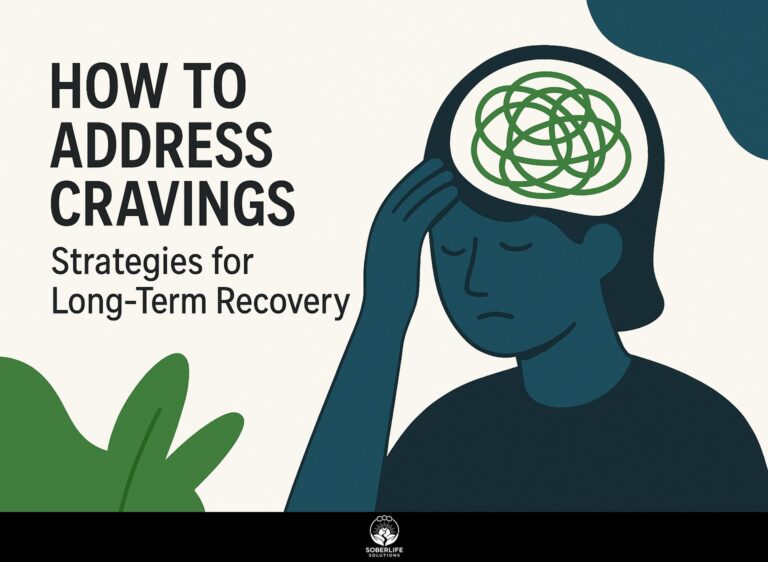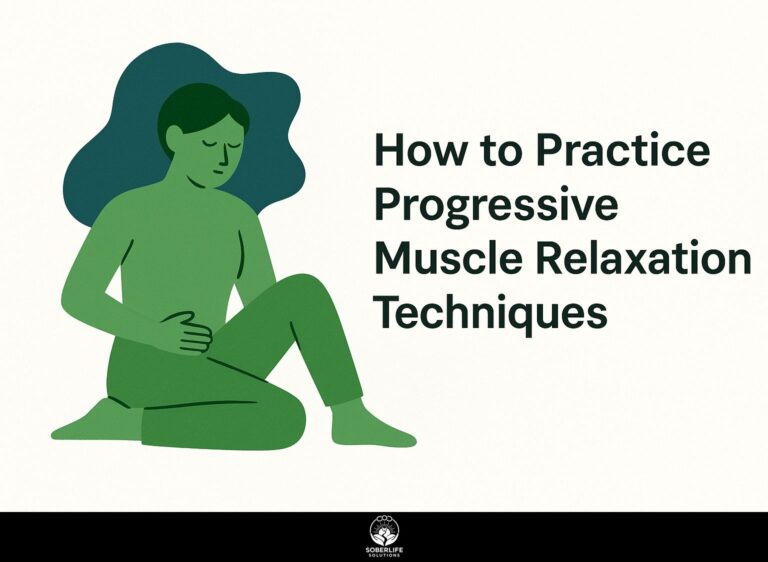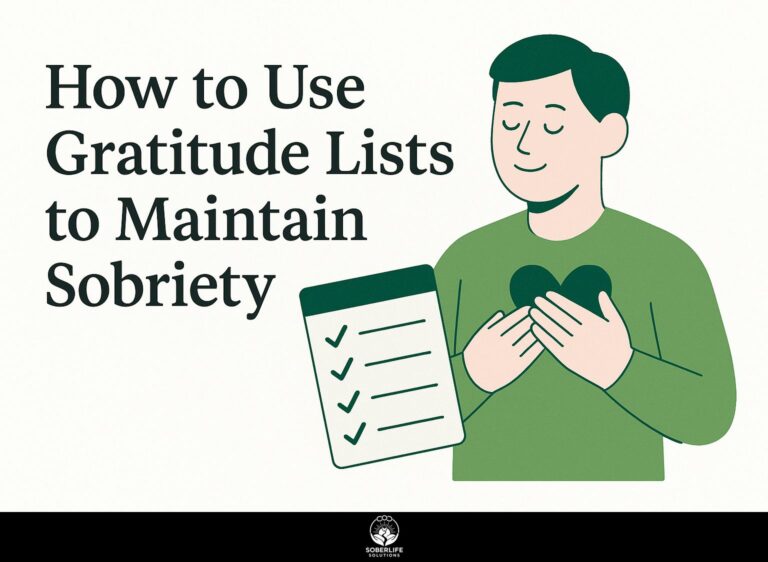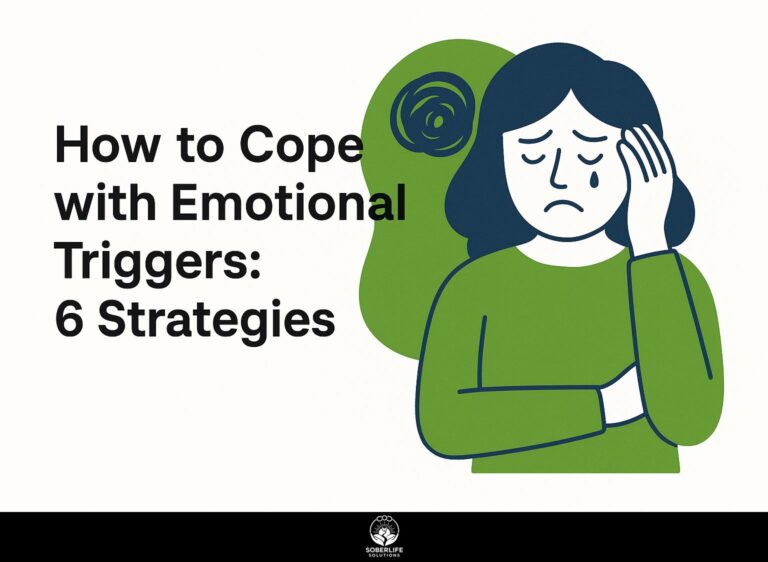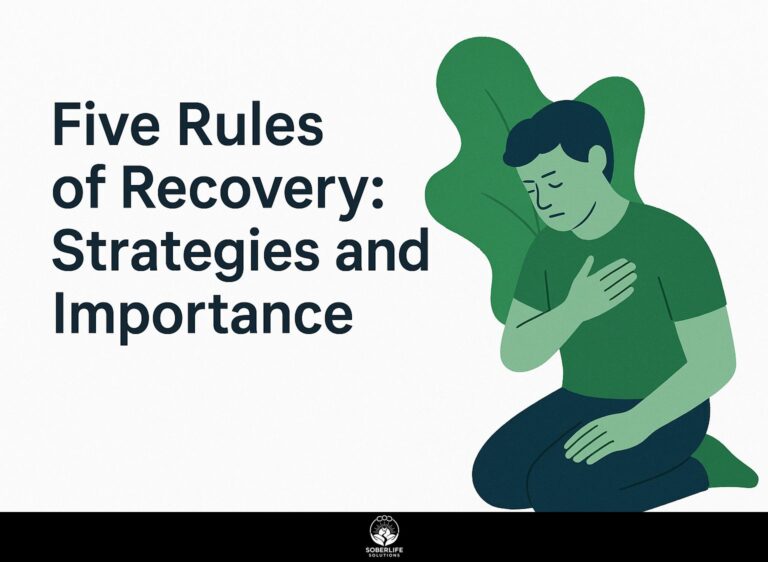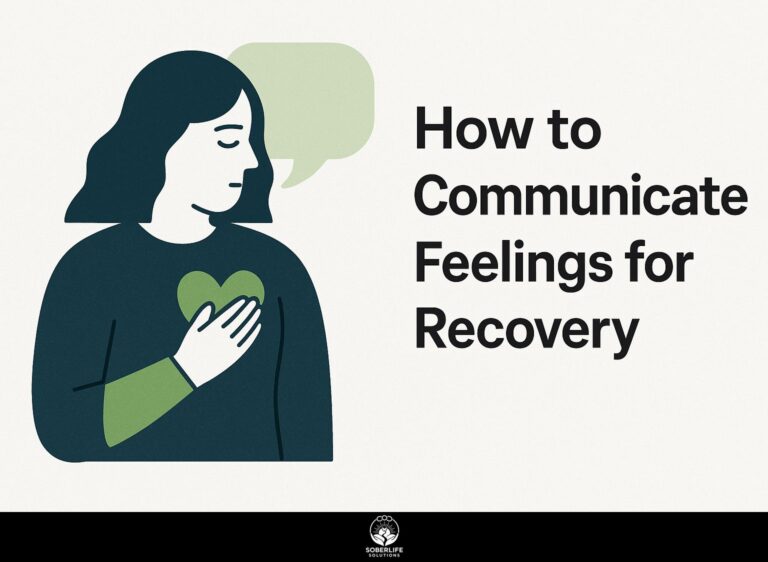Relapse Triggers: Identification, Risks, and Prevention Strategies
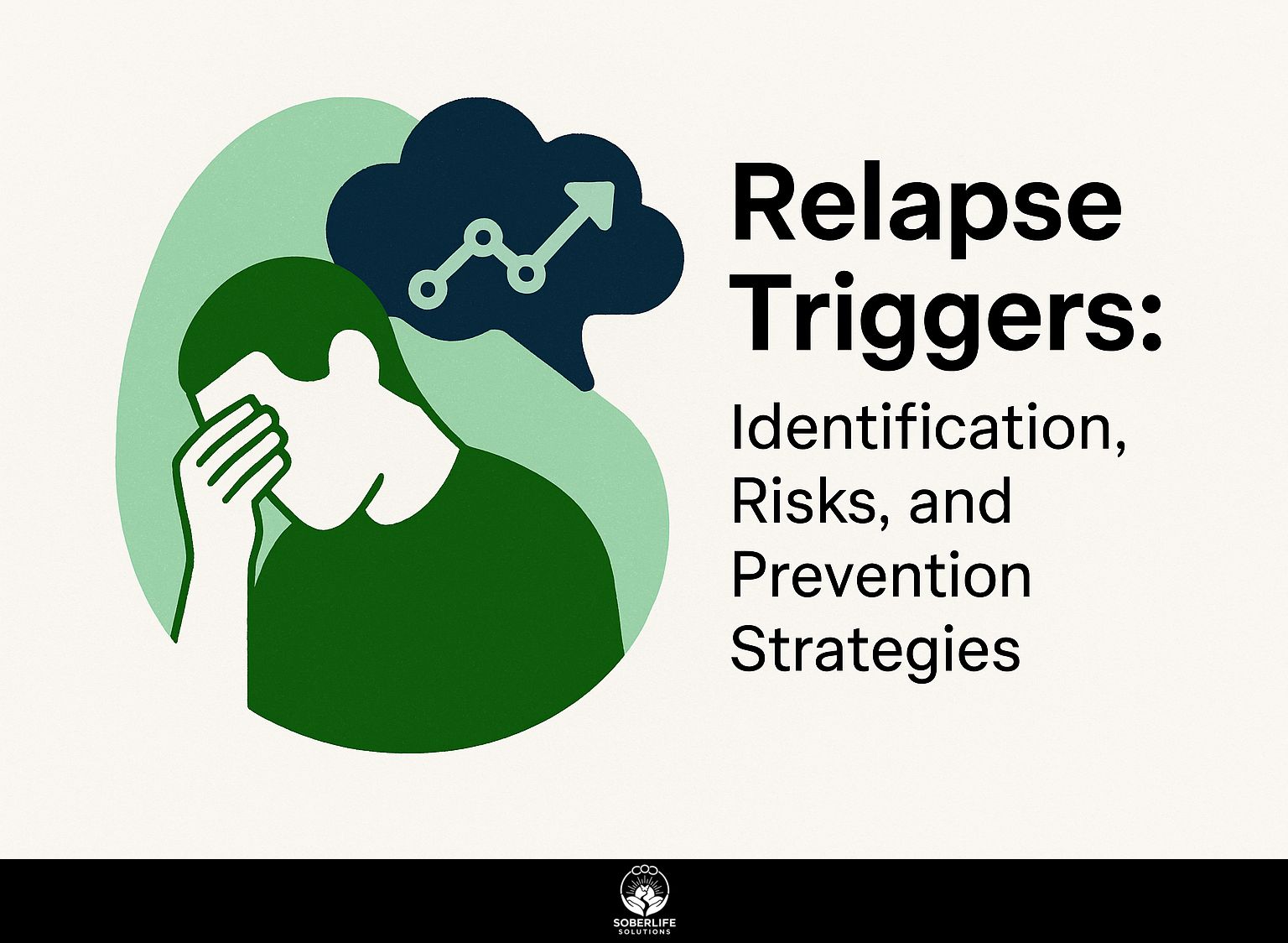
Recognizing what causes a relapse is important in overcoming addiction. These triggers can make it harder to recover from long-term health issues, so stopping relapse is very important. By using cognitive-behavioral methods and good social support, people can find and handle their own risks of slipping back into old habits. This article provides helpful information on identifying these triggers, their effects, and applying useful prevention methods for a stronger recovery process.
Key Takeaways:
Definition and Importance
Relapse triggers are defined as specific cues that can lead to a return to substance use after a period of abstinence.
These triggers can include emotional states, environmental cues, or social situations that are reminiscent of past substance use. Feeling stressed might make a person use drugs to avoid their problems.
Recognizing what causes your triggers is important. Research shows that about 70% of people in recovery encounter them. In fact, a study published on ScienceDirect highlights the determinants and prevalence of relapse, providing further insight into how these triggers operate.
To manage triggers, consider employing stress-reduction techniques such as:
- Mindfulness meditation
- Deep breathing exercises
Writing in a journal about these triggers can help spot patterns and develop ways to manage them.
Overview of Relapse in Addiction
Relapse is a common occurrence in addiction recovery, with studies indicating that over 50% of individuals relapse within the first year.
Learning what leads to relapse can help create effective strategies to prevent it. These factors often include emotional triggers, cravings, and environmental cues.
For instance, an individual may relapse after encountering stress or anxiety, which were previously addressed through substance use. Social situations where substances are present can create temptations.
It’s important for people in recovery to build a strong support system and continue therapy to reduce these risks. Practicing mindfulness and creating ways to handle stress can greatly strengthen the ability to avoid relapse. For those seeking to reinforce their recovery journey, a deep dive into various relapse prevention techniques can be invaluable. The Whole Health Library offers valuable insights into strategies for reducing relapse risk, further emphasizing the importance of comprehensive care and support.
Types of Relapse Triggers
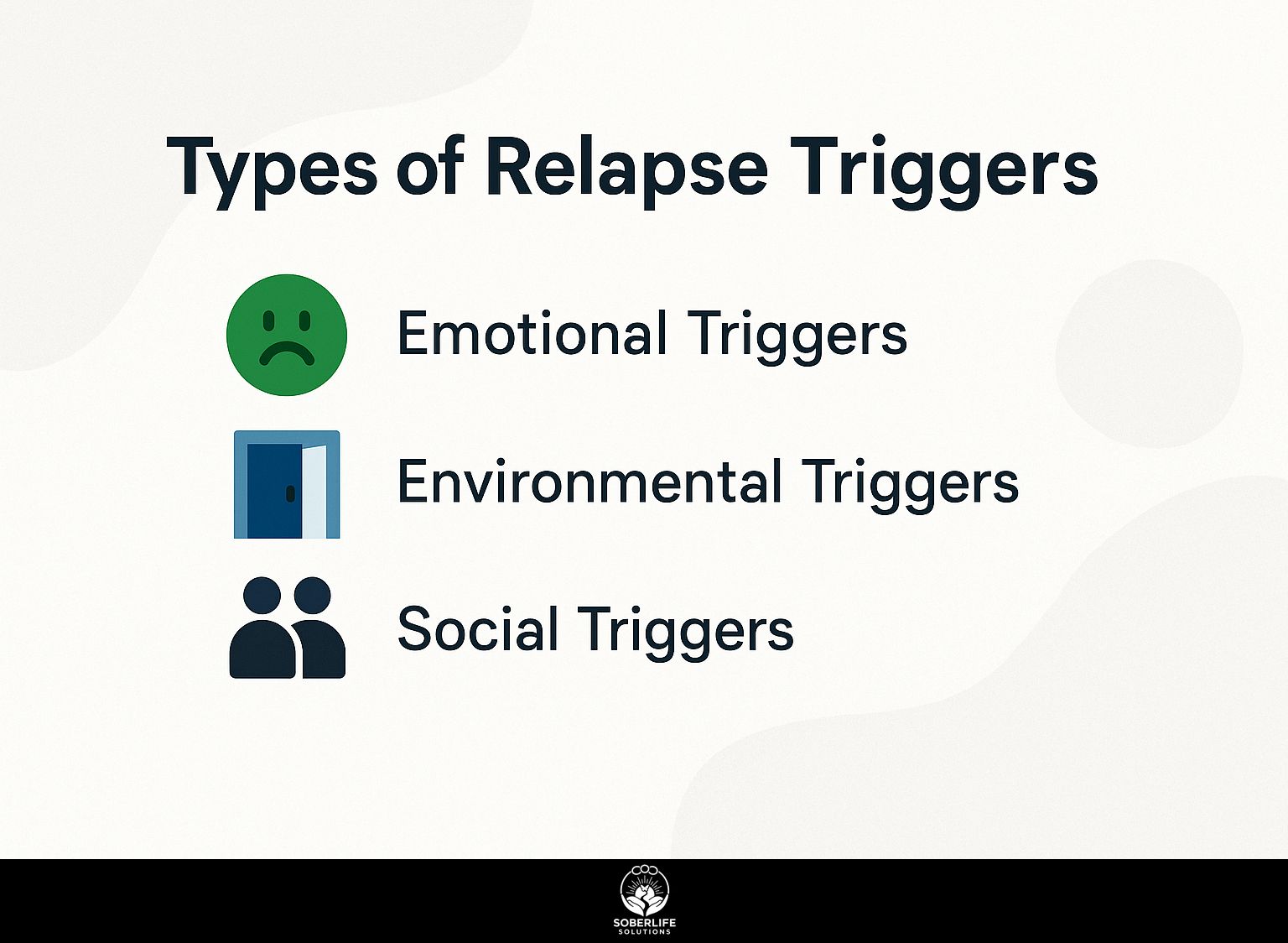
People in recovery should know about different types of relapse triggers, such as feelings, surroundings, and social influences. Understanding these triggers is crucial, as mentioned in our analysis of relapse prevention techniques, which provide essential strategies to manage them effectively.
Emotional Triggers
Emotional triggers, such as stress, anxiety, or depression, can lead to cravings and potential relapse in individuals recovering from addiction.
For example, feeling sad might lead to withdrawing from others, which can increase the risk of relapse. Strategies to cope with these triggers include practicing mindfulness by engaging in daily meditation or yoga, both of which can reduce anxiety levels.
Therapy can give individual support and strategies for handling issues. Support groups, like 12-step programs, can build community and accountability, helping people handle their emotions well.
Utilizing apps like Headspace for mindfulness or BetterHelp for therapy can make these resources more accessible.
Environmental Triggers
Environmental triggers encompass specific locations, people, or situations that can evoke cravings for substance use.
Common triggers include bars, parties, and certain social groups where substance use is prevalent. To prevent cravings, consider avoiding these environments altogether or altering your social circles.
Cue exposure therapy can help desensitize your response to these triggers. For example, try mindfulness exercises in a bar setting without consuming any substances, slowly getting used to the surroundings. Notably, ScienceDirect provides an overview of how such therapies function by reducing the power of triggers.
Using tools like journaling, where you write down emotions and urges linked to different triggers, can help you figure out when to steer clear of certain situations. This approach helps build strength to resist cravings.
Social Triggers
Social triggers can arise from interactions with individuals or groups who engage in substance use, presenting a risk for relapse.
To counteract these negative influences, it’s essential to build a supportive recovery community. Engage with local support groups like Alcoholics Anonymous (AA) or Narcotics Anonymous (NA), which provide a structured environment for sharing experiences and coping strategies.
Participating in positive social activities, such as joining a fitness class or volunteering, helps reinforce healthy habits and relationships. These activities can distract you from cravings and link you with people who support your sobriety.
Identifying Personal Triggers
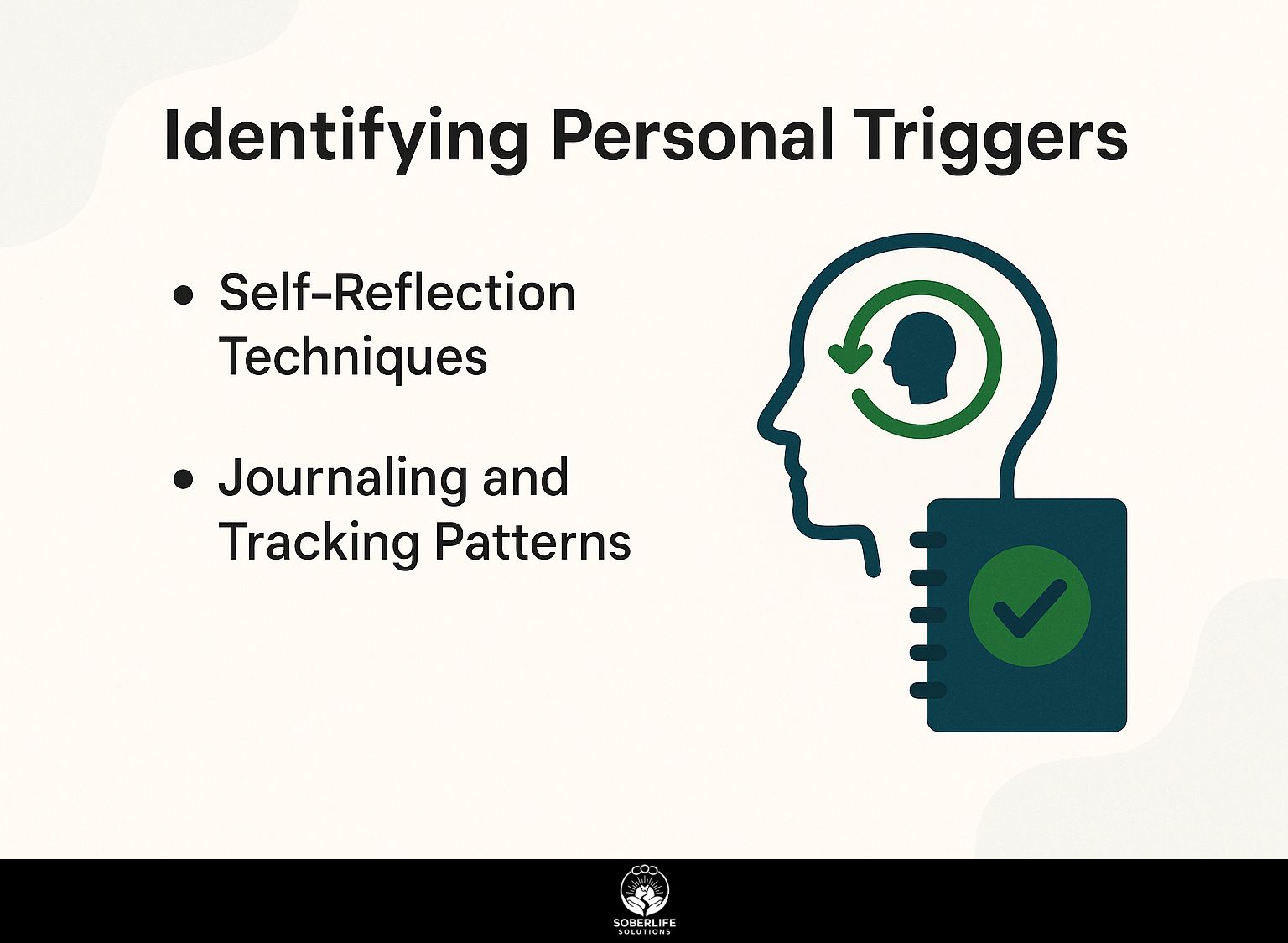
Recognizing what sets off personal relapse is an important part of avoiding it, helping people create specific ways to handle these situations. To further enhance your strategies, you might explore relapse prevention techniques that offer comprehensive approaches and insights.
Self-Reflection Techniques
Self-reflection techniques, including meditation and self-assessment, can help individuals pinpoint their personal triggers effectively.
-
One effective method is guided meditation, which can be practiced using apps like Headspace or Calm. Set aside just 10 minutes each day to focus on your breathing and observe your thoughts without judgment.
-
Cognitive restructuring can be practiced by identifying negative thought patterns. For example, when feeling anxious, challenge that thought: Is it based on facts or assumptions? Write down these thoughts in a journal to track and analyze them over time.
Checking yourself regularly with these methods can help you understand yourself better and grow emotionally.
Journaling and Tracking Patterns
Maintaining a journal can be an essential tool for tracking emotional states and identifying patterns related to relapse triggers.
To effectively use journaling for relapse prevention, start by recording specific details daily. Note your emotions, significant situations, and any cravings experienced.
For example, if you feel a craving during a stressful work meeting, document the stress level and your thoughts at that moment. Weekly, review your entries to identify recurring patterns, like stress or social situations triggering cravings.
Apps like Day One or Penzu send notifications and alerts to keep you engaged and track your progress in your recovery.
Risks Associated with Relapse
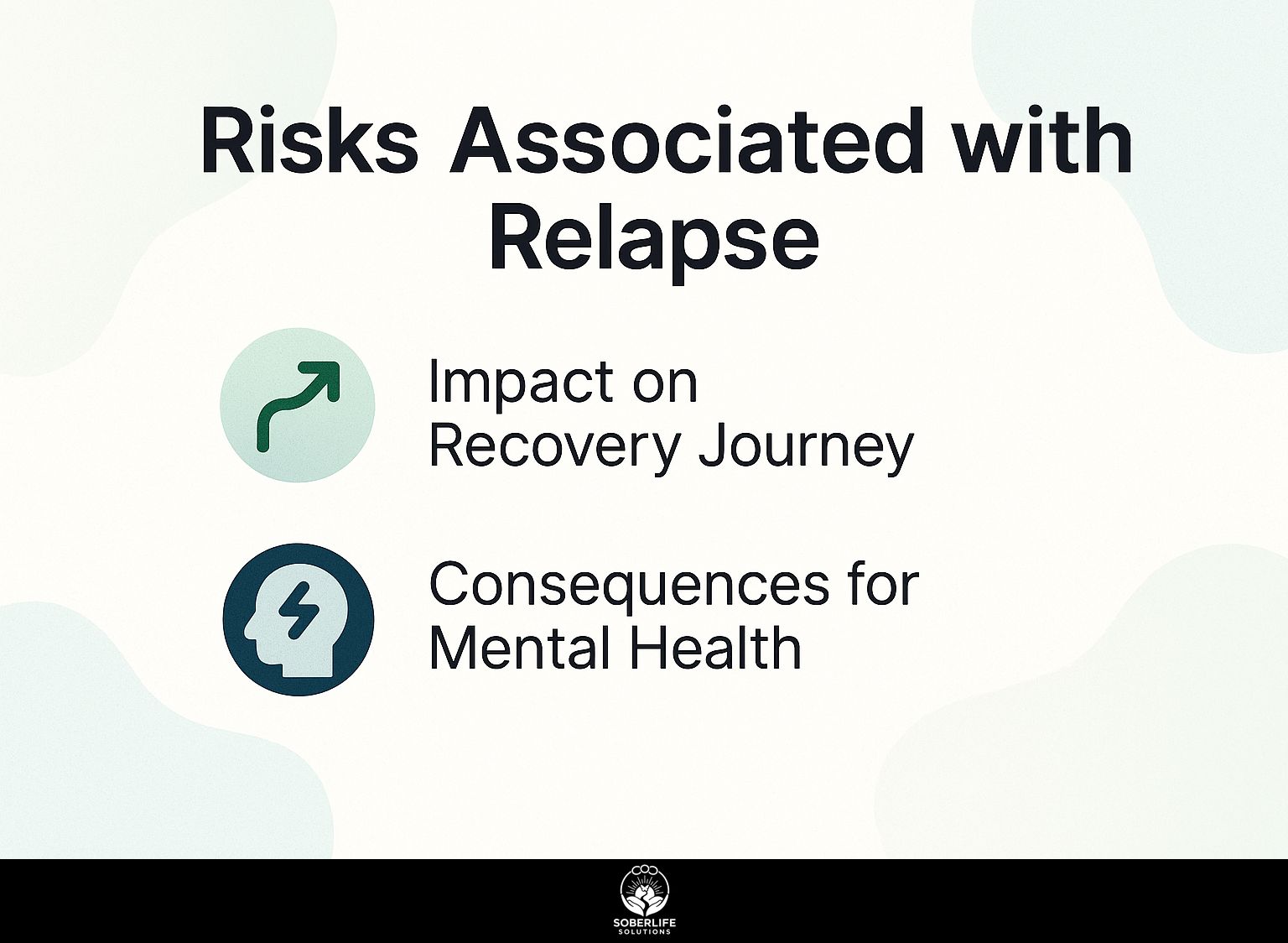
Knowing the risks of falling back into old patterns is important for keeping long-term recovery and good mental health. Developing a relapse prevention plan (our guide to creating key components covers essential strategies) can help maintain this balance.
Impact on Recovery Journey
Relapse can seriously interfere with a person’s path to recovery, often causing feelings of shame and lowered confidence in their ability to succeed.
This setback can adversely affect psychological well-being, contributing to anxiety, depression, and isolation. Statistics show that approximately 40-60% of people in recovery will experience a relapse.
To address this issue, using successful strategies to prevent relapse is important. Mindfulness practices can increase self-awareness, and support groups offer a space where people can hold each other responsible.
Setting up a structured daily routine can prevent boredom and trigger cravings. Regularly reviewing progress and celebrating small milestones can also help maintain motivation and reinforce a sense of accomplishment.
Consequences for Mental Health
The consequences of relapse can extend beyond substance use, negatively affecting mental health and overall well-being.
Relapse may trigger anxiety or depression, intensifying feelings of guilt or isolation. To combat these effects, consider practical coping strategies:
- Practice mindfulness through apps like Headspace.
- Establish a strong support network by joining local support groups.
- Exercise regularly, which can improve your mood.
Creating a routine with healthy food, enough sleep, and ways to lower stress is essential. Cognitive Behavioral Therapy (CBT) can provide ways to change negative thoughts, helping to create a healthier mindset and lowering the chances of relapse happening again.
Prevention Strategies
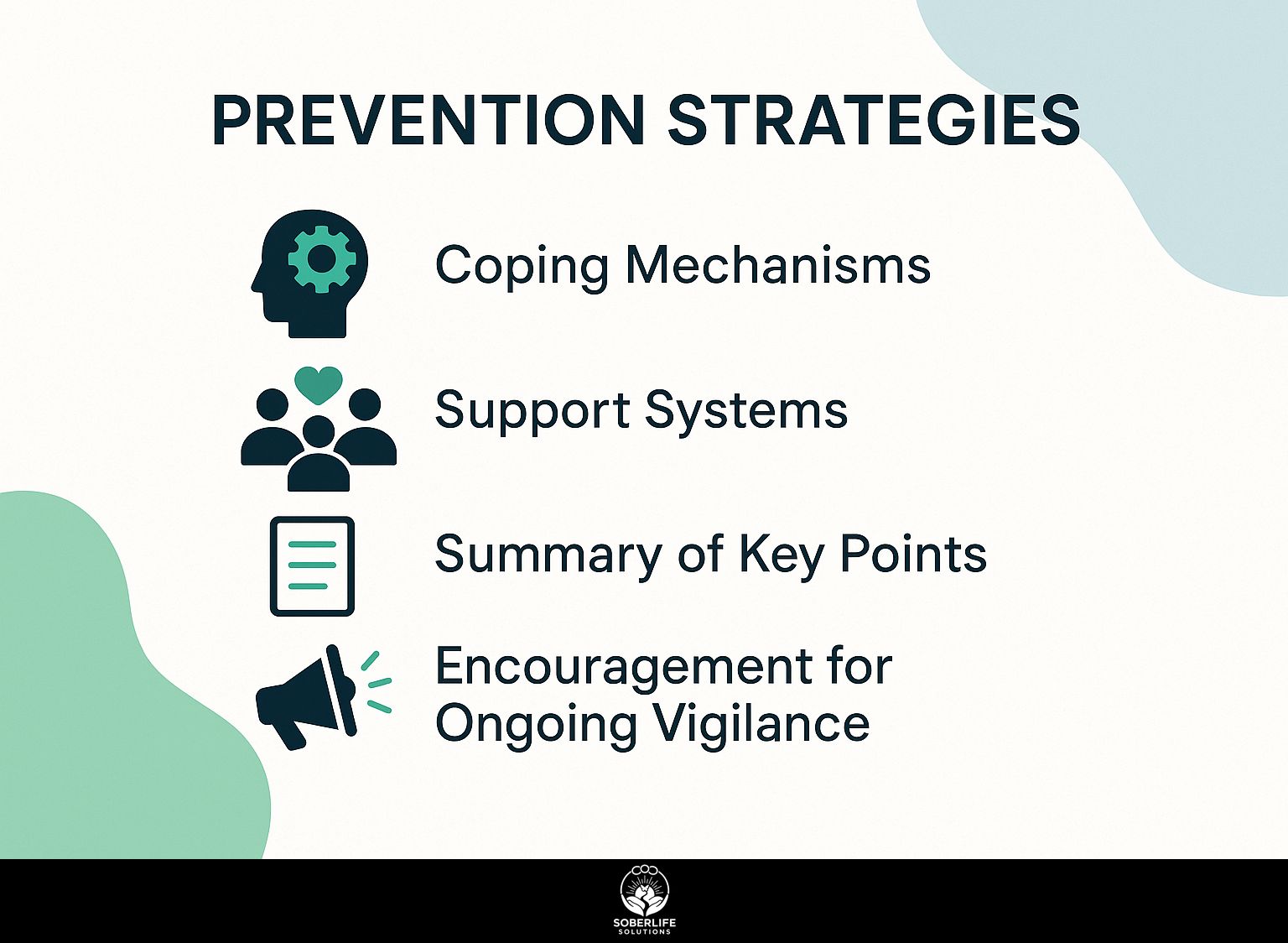
Using effective prevention methods can greatly lower the chance of relapse and help maintain recovery progress. For those looking to enhance their approach, discover our complete strategy for relapse prevention with practical techniques and insights.
Coping Mechanisms
Coping mechanisms such as urge surfing and positive self-talk are essential tools in managing cravings and avoiding relapse.
Urge surfing involves riding out the craving like a wave, allowing it to peak and then diminish. To practice this, find a quiet space, close your eyes, and focus on your breathing for 5-10 minutes. A timer can help you stay committed.
Simultaneously, implement positive self-talk by reframing negative thoughts. For instance, instead of thinking, ‘I can’t resist,’ remind yourself, ‘I have the strength to choose healthier options.’
Writing about these experiences can help you remember your achievements and plans, which makes it easier to avoid returning to old habits later.
Support Systems
Creating a dependable support network is important for people in recovery, offering them practical help and emotional support.
Joining support groups can help you recover faster. Start by joining meetings. Many people find help in 12-step groups like Alcoholics Anonymous or SMART Recovery, which encourage discussion and responsibility.
Consider online forums for anonymity and accessibility. Having a mentor or sponsor can give you advice that matches your needs. Remember, talking about what you’ve been through can help build relationships, so feel free to share.
Consistency in your attendance and involvement will strengthen your network, creating a sense of belonging essential for continued recovery.
Summary of Key Points
The key points about relapse triggers involve recognizing emotional, environmental, and social factors that influence recovery.
To address these triggers effectively, start by maintaining a detailed journal to track your emotional states. Identify specific situations, such as stress or loneliness, that lead to cravings.
Create a structured environment: remove substances and limit contact with people who are not supportive of your recovery. Have regular conversations with a therapist or become a part of support groups like SMART Recovery. Utilizing apps like Sober Grid can also help you connect with others for encouragement.
These steps increase self-awareness and create a strong support network.
Encouragement for Ongoing Vigilance
Keeping an eye on things that might cause a relapse is important for staying on track and improving oneself.
To effectively manage triggers, consider implementing a proactive self-care routine. Start by identifying triggers through journaling, noting emotional fluctuations or high-risk situations.
Next, develop coping strategies such as practicing mindfulness or engaging in physical activity, like jogging or yoga, to refocus your energy.
Build a support network by attending support group meetings or connecting with recovery apps like Sober Grid or I Am Sober. Staying involved with your recovery group and often thinking about how you feel can greatly improve your ability to avoid relapsing.
Frequently Asked Questions
What are some common relapse triggers and how can they be identified?
Some common relapse triggers include stress, negative emotions, boredom, exposure to drugs or alcohol, and social pressure. These can be identified through self-reflection, therapy, and keeping track of patterns and situations that lead to relapse.
What are the risks associated with relapse triggers?
The risks of relapse triggers include a return to substance use, potential harm to oneself or others, and negative impacts on relationships, work, and overall well-being. Relapse can also lead to feelings of shame, guilt, and loss of progress in recovery.
How can relapse triggers be avoided or prevented?
Relapse triggers can be avoided or prevented through practicing healthy coping mechanisms and building a strong support system. Doing activities that make you happy and give you a sense of purpose, getting help from professionals, and using techniques like mindfulness and managing your emotions can help prevent relapse.
What can be done if a relapse trigger is unavoidable?
If a relapse trigger is unavoidable, it is important to have a plan in place. This can involve talking to a reliable friend or family member, going to a support group, or getting help from a therapist. It is also important to practice self-care and remind oneself of the progress made in recovery.
How can loved ones support someone in identifying and managing relapse triggers?
Family and friends can help someone recognize and handle situations that might lead to relapse by listening carefully and offering a supportive and non-judgmental space. They can also help by encouraging healthy coping mechanisms, being aware of potential triggers, and being available for support when needed.
What role does self-awareness play in identifying and managing relapse triggers?
Knowing yourself helps you identify and manage triggers that could lead to a relapse. It means being aware of your thoughts, feelings, and actions and knowing how they can cause relapse. By increasing self-awareness, individuals can develop strategies to cope and address potential triggers before they lead to relapse.

